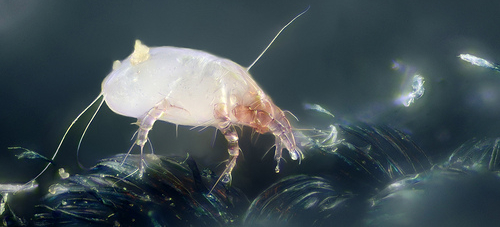When you are moving out, the idea is to get as much of your initial deposit back from your landlord as you can. To do this thorough end of tenancy cleaning is a job that you or a professional cleaning company will need to do.
Unfortunately, this deep cleaning will stir up a great deal of dust. For those with allergies doing the cleaning themselves will mean a lot of discomfort, sniffs, sneezes and watery eyes.

House dust mites are the biggest problem for people who suffer from allergies when doing end of tenancy cleaning. Photo courtesy of Gilles San Martin(CC ShareALike)
Our End Of Tenancy Cleaning Tips for Allergy Sufferers Busting Tips
Here are some tips to minimize problems for allergy sufferers doing their end of tenancy cleaning.
- Have a non-allergy-sufferer do the “dirty work.” Consider trading chores with a friend who will clean your place in exchange for a night or two of baby-sitting, for example.
- If you must do the cleaning yourself, wear gloves, a surgical-style face mask, and glasses or goggles. Work quickly to limit your exposure. When you’re done, change into clean clothes and immediately leave the premises; this allows for the settling of allergens kicked up while you were cleaning.
- Mop floors and vacuum carpets using a clean mop and a vacuum cleaner with a special anti-allergen device called a HEPA filter. HEPA stands for “high efficiency particulate air,” and these filters trap tiny particles that otherwise become airborne as you vacuum. Change filters often.
- Avoid chemical cleaners. Go “green” with less irritating products. Consider making your own from white vinegar and baking soda—it’s easy to find recipes on the Internet.
- Maintain good housekeeping practices throughout your stay in the home. This avoids allergen build-up, so when you do your end of tenancy cleaning, you won’t be bombarded by huge amounts of pollen, pet dander, and dust mites.
- Throughout your stay, keep flat surfaces clean and uncluttered. Wipe counters and desks after each use. Dust often. Never let clutter accumulate, because clutter attracts dust and dust causes allergies. Consider eliminating dust-catching knick-knacks; if you must display them, use a case with glass doors.
- Regularly launder blankets and throw rugs to eliminate allergen build-up. Change bed linens weekly and bath linens daily. Wash and dry on the hottest settings. And never hang things outside on a clothesline where they can attract pollen and molds.
A good vacuum cleaner is also important for people who suffer from allergies. Here is a brief video showing you what to look out for if you need a new vacuum cleaner and suffer from allergies.
The bottom line is this: if you’re worried that deep cleaning and stirring up dust will cause you to have an allergic reaction, call a professional company to do your end of tenancy cleaning. Not only will you minimize your exposure to harmful allergens, you’ll end up with a much better cleaning job than you could have done by yourself.
References
- Aguirre, S. (n.d.). What is a HEPA filter and do I need one? About.
- McCoy, K. (n.d.). Home cleaning tips for allergy sufferers. Everyday Health.
- Pongdee, T. (n.d.). Cleaning tips for allergy and asthma sufferers. American Academy of Allergy, Asthma, and Immunology.
- Ratini, M. (n.d.). Housecleaning tips to ease allergies. WebMD.
We provide high-quality cleaning service at an affordable price. Our experienced team of professionals prides themselves in maintaining the highest standards.
When you move out from a rented property, there are a number of things which must be planned and organized. This includes the end of tenancy cleaning, which a large number of landlords are now insisting be done by a professional cleaning company. Our end of tenancy cleaning services are designed to help take the pressure off you and ensure that you are 100% satisfied with the outcome.

